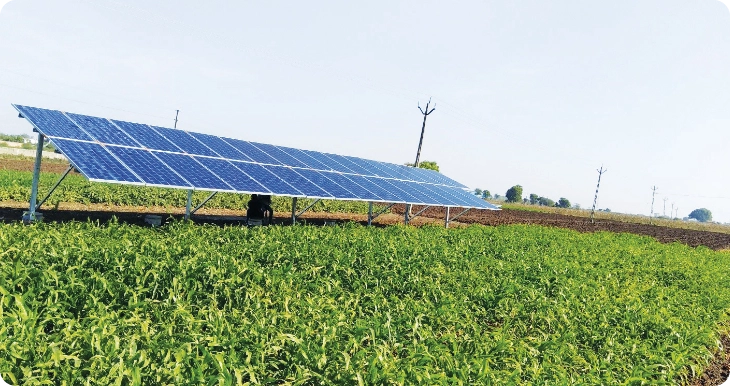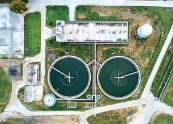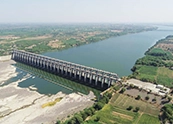4.5 Building Climate-Resilient Infrastructure
Infrastructure is a cornerstone in the strategies aimed at mitigating the risks and adverse effects of climate change. The observable impacts of climate change, such as increasing temperatures, changing precipitation patterns, more frequent and severe extreme weather events, and rising sea levels, will profoundly affect various types of infrastructure. Therefore, it is crucial to plan, build, and manage infrastructure to be resilient and adaptable to these evolving climatic conditions. This involves meticulous planning, construction, and upkeep of infrastructure to withstand extreme weather events and other climate-related impacts.

NABARD has been instrumental in financing infrastructure projects through the Rural Infrastructure Development Fund (RIDF) and the National Infrastructure Development Assistance (NIDA). These initiatives are pivotal in supporting the adaptation to and mitigation of climate-related risks. NABARD’s efforts are in alignment with the objectives of the Nationally Determined Contributions (NDCs) and significantly contribute to the advancement of rural prosperity.
NABARD contributed to the state share of flagship GOI schemes by sanctioning projects worth ₹51.55 bilion under Jal Jeevan Mission, ₹10.63 billion under Pradhan Mantri Kusum Yojana, and ₹6.17 crore towards the installation of 20,000 solar-powered pump sets under the Saur Sujala Scheme in Chhattisgarh.
Under NIDA, NABARD has funded 4 solar and 5 wind power projects in 7 states. This has facilitated the generation of renewable power, boosting capacity by 113 megawatt (MW).
Under RIDF, NABARD has funded generation of 15 megawatt of renewable power capacity.
Adaptation Fund Performance
NAFCC: Nationwide Impact
- Andhra Pradesh
Climate resilient interventions across dairy sector in coastal and arid areas
(127.13) (10,291)
- Arunachal Pradesh
Addressing Climate Change Vulnerability of Papum-Poma River for
conservation and recharging of its springs(239.15) (584)
- Assam
Management of Ecosystem of Kaziranga National Park by Creating Climate Resilient Livelihood for Vulnerable Communities through Organic farming and Pond Based Pisciculture in Kaziranga National Park
(245.66) (2,365)
- Bihar
Scaling up of climate smart agriculture through mainstreaming climate smart villages
(230.66) (10,000)
- Chhattisgarh
Climate Adaptation Strategies in Wetlands along Mahanadi River Catchment areas
(214.72) (NA)
- Gujarat
Climate Change Adaptation for Natural Resource Dependent Communities in Kachchh, Gujarat: Strengthening Resilience through Water & Livelihood Security and Ecosystem Restoration
(213.58) (2,170)
- Haryana
Scaling up climate smart agriculture through mainstreaming climate smart villages
(220.98) (NA)
- Himachal Pradesh
Sustainable Livelihoods of Agriculture-Dependent Rural Communities in Drought Prone District of HP through Climate Smart Solutions
(200) (30,000)
- Jammu and Kashmir
Climate Resilient Sustainable Agriculture in Rain-Fed Farming (Kandi) Areas
(225.15) (4,679)
- Jharkhand
Enhancing climate resilience of forests and its dependent communities in two landscapes
(247.32) (6,477)
- Karnataka
Conservation and Management of indigenous varieties of livestocks
(188.15) (2,080)
- Kerala
Promotion of Integrated Farming System of Kaipad and Pokkali in Costal Wet-lands
(250) (600)
- Madhya Pradesh
Enhancing adaptation capacity to climate change through development of climate smart villages
(248.78) (66,107)
- Maharashtra
Efficient Water Mgt. and Agriculture Technology Adoption for Climate Adaptive and Resilient Farming System in 51 villages of Nandurbar and Buldhana Districts
(229.45) (3,822)
- Manipur
Model Carbon Positive Eco-Village In Phayeng
(100) (864)
- Meghalaya
Spring-shed development works for rejuvenation of springs for climate resilient development in the water stressed areas
(229.1) (13,636)
- Mizoram
Sustainable Agriculture Development through Expansion, Enhancement and Modelling
(103.80) (2,954)
- Nagaland
Gene pool conservation of indigenous variestie under traditional integrated rational farming system (Jhum optimisation) for promoting livelihood and food security as climate change adaptation strategy
(246.67) (1,000)
- Odisha
Conserve water through the management of run-off in the river basin to improve groundwater recharge to reduce vulnerability and enhance resilience for traditional livelihood in Nuapada
(200) (1,312)
- Puducherry
Integrated surface water management through rejuvenation of 20 tanks and 32 village ponds for climate change adaptation in Puducherry
(167.6) (20,162)
- Punjab
Towards Climate Resilient Livestock Production System
(174) (1,27,272)
- Rajasthan
Mukhya Mantri Jal Swavlamban Abhiyaan for Climate Change Adaptation and Water Harvesting in Arthuna, Anandpuri and Sajjangarh blocks of District Banswara
(249.77) (44,759)
- Sikkim
Addressing Climate Change Vulnerability of Water Sector at Gram Panchayat Level in Drought Prone areas
(246.67) (40,000)
- Tamil Nadu
■ Management and rehabilitation of coastal habitats and biodiversity for Climate Change Adaptation and Sustainable Livelihood in Gulf of Mannar
(247.4) (NA)■ Climate proofing of rainfed watersheds in Salem and Virudhunagar districts
(238.02) (4,456)
- Telangana
Resilient Agricultural Households through Adaptation to Climate Change
(240.03) (3,438)
- Uttar Pradesh
Ecosystem Services based adaptation to climate change in Bundelkhand region
(198.04) (2,631)
- West Bengal
Rain Water Harvesting and Sustainable Water Supply to the Hilly Areas in Darjeeling as an Adaptive Measure to Potential Climate Change Impacts
(200.74) (NA)



